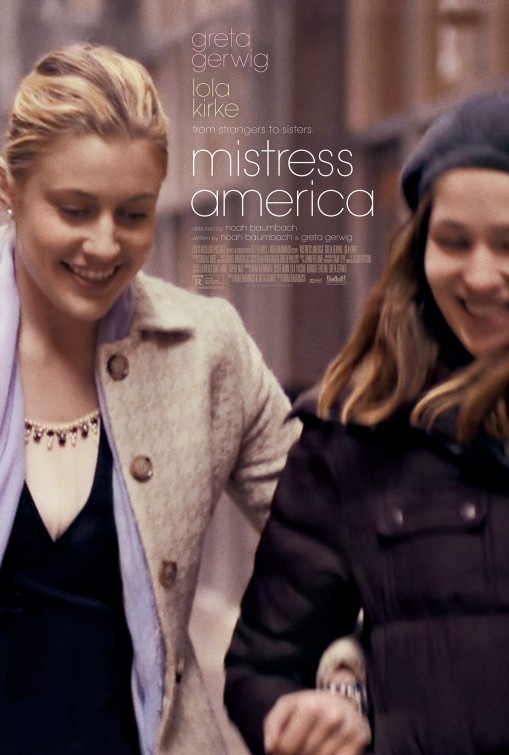The Meyerowitz Stories comes to Netflix this week, so Chris looks back at Noah Baumbach's last farce...
 It's not uncommon for a hip song to singularly define a film, but rarely do they also unlock or embody a character with equal force. When Mistress America does so with “You Could’ve Been A Lady” by Hot Chocolate it’s working with a character that wants to similarly been seen as a lot of things, but most importantly cool. As if Great Greta Gerwig could ever be seen as something less than complex and cool as heck.
It's not uncommon for a hip song to singularly define a film, but rarely do they also unlock or embody a character with equal force. When Mistress America does so with “You Could’ve Been A Lady” by Hot Chocolate it’s working with a character that wants to similarly been seen as a lot of things, but most importantly cool. As if Great Greta Gerwig could ever be seen as something less than complex and cool as heck.
Mistress America takes off musically with a more subdued approach. Lola Kirke’s Tracy arrives at college, one of the times where we we allow music to outwardly define us, whether it’s a dorm poster or conversation starter. It's no surprise that college films lean in heavy on contemporary musical hipness for their identity. This film instead first relies on Britta Phillips and Dean Wareham’s score instead, presenting impressionable Tracy as a somewhat blank slate. That is until the film’s signature track busts in and dominates just like Gerwig’s Brooke.
In short order, the song announces her presence and allows us to delight in her buffoonery. Just like the bright lights of Times Square, the funk groove casts a glow over Brooke’s psychosis that leaves us as smitten as Tracy.

This song just feels built for a movie musical sequence. It’s like a rollicking heist montage, but it’s Tracy’s affection that is being swept off in the con. Brooke hops on stage as the song overlaps, her arm-waving performance truncated as if "... Lady" could easily be the number she’s about to begin singing. There are a few more bar or party stops, Hot Chocolate capturing the mood of a night that becomes one massive blur. At least before Brooke’s horn section reveals her grating side.
If it’s the kind of song you would hear in the background of a party, then it’s the perfect song for a character that presents their foreground as a constant party. I mean, this is a 70s rock & soul tune - it couldn’t be more removed from Brooke’s reality, which only amplifies her performative hipness. Her soul is just another thing she avoids. What theme song would your own personal delusions produce? Or someone else’s perceptions of you, awe-inspired or otherwise? I bet it’s not as banging as Brooke’s.


In that regard the song choice says as much about Brooke as it does about how Tracy sees her, and perhaps Tracy herself. Especially at her age, our perceptions reveal as much about where we are as our actions. Tracy wants to be given a path to follow, an inspiration, a beat to follow before she create her own. When Hot Chocolate comes back in after the relationship becomes strained, naturally some of its charm has been lost.
So Tracy finally gets some music of her own when Suicide’s “Dream Baby Dream” trickles in. A hipster college girl’s version of a cliche, sure, but its mere inclusion hints of her beginning to stand on her own creative feet. Maybe it doesn’t make her as unique as she wants, but at least it feels more genuine.
Previous Soundtracking Favorites:
The Lure
The Breakfast Club
Almost Famous
Young Adult
A Bigger Splash
...all installments can be found here!